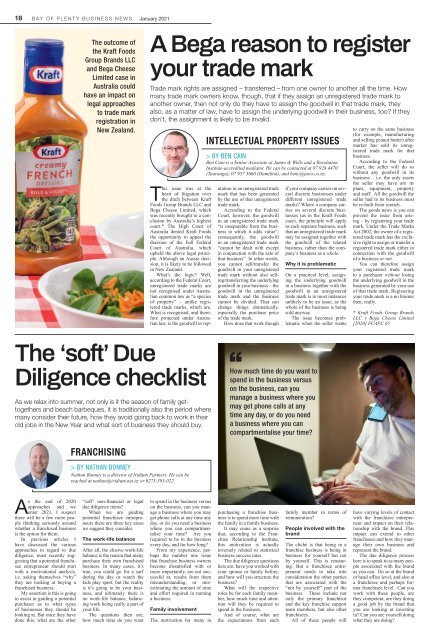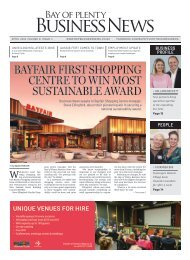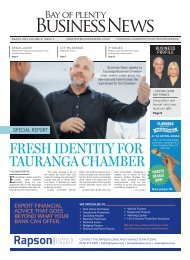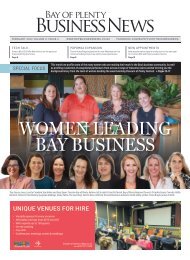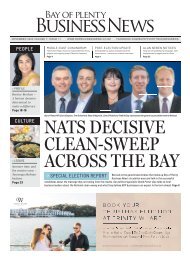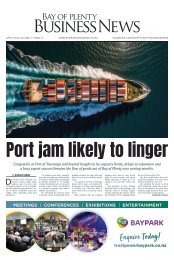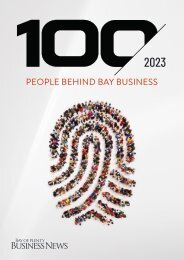January 2021 - Bay of Plenty Business News
Create successful ePaper yourself
Turn your PDF publications into a flip-book with our unique Google optimized e-Paper software.
18 BAY OF PLENTY BUSINESS NEWS <strong>January</strong> <strong>2021</strong><br />
The outcome <strong>of</strong><br />
the Kraft Foods<br />
Group Brands LLC<br />
and Bega Cheese<br />
Limited case in<br />
Australia could<br />
have an impact on<br />
legal approaches<br />
to trade mark<br />
registration in<br />
New Zealand.<br />
A Bega reason to register<br />
your trade mark<br />
Trade mark rights are assigned – transferred – from one owner to another all the time. How<br />
many trade mark owners know, though, that if they assign an unregistered trade mark to<br />
another owner, then not only do they have to assign the goodwill in that trade mark, they<br />
also, as a matter <strong>of</strong> law, have to assign the underlying goodwill in their business, too? If they<br />
don’t, the assignment is likely to be invalid.<br />
INTELLECTUAL PROPERTY ISSUES<br />
> BY BEN CAIN<br />
Ben Cain is a Senior Associate at James & Wells and a Resolution<br />
Institute-accredited mediator. He can be contacted at 07 928 4470<br />
(Tauranga), 07 957 5660 (Hamilton), and benc@jaws.co.nz.<br />
This issue was at the<br />
heart <strong>of</strong> litigation over<br />
the ditch between Kraft<br />
Foods Group Brands LLC and<br />
Bega Cheese Limited, which<br />
was recently brought to a conclusion<br />
by Australia’s highest<br />
court.* The High Court <strong>of</strong><br />
Australia denied Kraft Foods<br />
the opportunity to appeal the<br />
decision <strong>of</strong> the Full Federal<br />
Court <strong>of</strong> Australia, which<br />
upheld the above legal principle.<br />
Although an Aussie decision,<br />
it is likely to be followed<br />
in New Zealand.<br />
What’s the logic? Well,<br />
according to the Federal Court,<br />
unregistered trade marks are<br />
not recognised under Australian<br />
common law as “a species<br />
<strong>of</strong> property” – unlike registered<br />
trade marks, which are.<br />
What is recognised, and therefore<br />
protected under Australian<br />
law, is the goodwill or reputation<br />
in an unregistered trade<br />
mark that has been generated<br />
by the use <strong>of</strong> that unregistered<br />
trade mark.<br />
According to the Federal<br />
Court, however, the goodwill<br />
in an unregistered trade mark<br />
“is inseparable from the business<br />
to which it adds value”;<br />
consequently, the goodwill<br />
in an unregistered trade mark<br />
“cannot be dealt with except<br />
in conjunction with the sale <strong>of</strong><br />
that business”. In other words,<br />
you cannot sell/transfer the<br />
goodwill in your unregistered<br />
trade mark without also selling/transferring<br />
the underlying<br />
goodwill in your business – the<br />
goodwill in the unregistered<br />
trade mark and the business<br />
cannot be divided. That can<br />
change things dramatically,<br />
especially the purchase price<br />
<strong>of</strong> the trade mark.<br />
How does that work though<br />
if your company carries on several<br />
discrete businesses under<br />
different unregistered trade<br />
marks? Where a company carries<br />
on several discrete businesses<br />
(as in the Kraft Foods<br />
case), the principle will apply<br />
to each separate business, such<br />
that an unregistered trade mark<br />
may be assigned together with<br />
the goodwill <strong>of</strong> the related<br />
business, rather than the company’s<br />
business as a whole.<br />
Why it is problematic<br />
On a practical level, assigning<br />
the underlying goodwill<br />
in a business together with the<br />
goodwill in an unregistered<br />
trade mark is in most instances<br />
unlikely to be an issue, as the<br />
whole <strong>of</strong> the business is being<br />
sold anyway.<br />
The issue becomes problematic<br />
when the seller wants<br />
to carry on the same business<br />
(for example, manufacturing<br />
and selling peanut butter) after<br />
market has sold its unregistered<br />
trade mark for that<br />
business.<br />
According to the Federal<br />
Court, the seller will do so<br />
without any goodwill in its<br />
business – i.e. the only assets<br />
the seller may have are its<br />
plant, equipment, property<br />
and staff. All the goodwill the<br />
seller had in its business must<br />
be re-built from scratch.<br />
The goods news is you can<br />
prevent the issue from arising<br />
– by registering your trade<br />
mark. Under the Trade Marks<br />
Act 2002, the owner <strong>of</strong> a registered<br />
trade mark has the exclusive<br />
right to assign or transfer a<br />
registered trade mark either in<br />
connection with the goodwill<br />
<strong>of</strong> a business or not.<br />
You can therefore assign<br />
your registered trade mark<br />
to a purchaser without losing<br />
the underlying goodwill in the<br />
business generated by your use<br />
<strong>of</strong> that trade mark. Registering<br />
your trade mark is a no brainer<br />
then, really.<br />
* Kraft Foods Group Brands<br />
LLC v Bega Cheese Limited<br />
[2020] FCAFC 65<br />
The ‘s<strong>of</strong>t’ Due<br />
Diligence checklist<br />
As we relax into summer, not only is it the season <strong>of</strong> family gettogethers<br />
and beach barbeques, it is traditionally also the period where<br />
many consider their future, how they avoid going back to work in their<br />
old jobs in the New Year and what sort <strong>of</strong> business they should buy.<br />
How much time do you want to<br />
spend in the business versus<br />
on the business, can you<br />
manage a business where you<br />
may get phone calls at any<br />
time any day, or do you need<br />
a business where you can<br />
compartmentalise your time?<br />
FRANCHISING<br />
> BY NATHAN BONNEY<br />
Nathan Bonney is a director <strong>of</strong> Iridium Partners. He can be<br />
reached at nathan@iridium.net.nz or 0275-393-022<br />
As the end <strong>of</strong> 2020<br />
approaches and we<br />
enter <strong>2021</strong>, I suspect<br />
there will be a few more people<br />
thinking seriously around<br />
whether a franchised business<br />
is the option for them.<br />
In previous articles I<br />
have discussed the various<br />
approaches in regard to due<br />
diligence, most recently suggesting<br />
that a potential franchisee<br />
entrepreneur should start<br />
with a motivational analysis,<br />
i.e. asking themselves “why”<br />
they are looking at buying a<br />
franchised business.<br />
My assertion is this is going<br />
to assist in guiding a potential<br />
purchaser as to what types<br />
<strong>of</strong> businesses they should be<br />
looking at. But once they have<br />
done this, what are the other<br />
“s<strong>of</strong>t” non-financial or legal<br />
due diligence items?<br />
When we are guiding<br />
potential franchisee entrepreneurs<br />
there are three key areas<br />
we suggest they consider.<br />
The work-life balance<br />
After all, the elusive work-life<br />
balance is the reason that many<br />
purchase their own franchised<br />
business. In many cases, it’s<br />
true, you could go for a surf<br />
during the day or watch the<br />
kids play sport, but the reality<br />
is it’s going to be your business,<br />
and ultimately there is<br />
no work-life balance, balancing<br />
work being really a part <strong>of</strong><br />
your life.<br />
The questions then are,<br />
how much time do you want<br />
to spend in the business versus<br />
on the business, can you manage<br />
a business where you may<br />
get phone calls at any time any<br />
day, or do you need a business<br />
where you can compartmentalise<br />
your time? Are you<br />
required to be in the business<br />
every day, and for how long?<br />
From my experience, perhaps<br />
the number one issue<br />
that franchise business owners<br />
become dissatisfied with or<br />
more importantly, are not successful<br />
at, results from them<br />
misunderstanding, or misestimating<br />
the amount <strong>of</strong> time<br />
and effort required in running<br />
a business.<br />
Family involvement<br />
The motivation for many in<br />
purchasing a franchise business<br />
is to spend more time with<br />
the family in a family business.<br />
It may come as a surprise<br />
that, according to the Franchise<br />
Relationship Institute,<br />
this motivation is actually<br />
inversely related to statistical<br />
business success rates.<br />
The due diligence questions<br />
here are: have you worked with<br />
your spouse or family before,<br />
and how will you structure the<br />
business?<br />
What will the respective<br />
roles be for each family member,<br />
how much time and attention<br />
will they be required to<br />
spend in the business.<br />
And <strong>of</strong> course, what are<br />
the expectations from each<br />
family member in terms <strong>of</strong><br />
remuneration?<br />
People involved with the<br />
brand<br />
The cliché is that being in a<br />
franchise business is being in<br />
business for yourself but not<br />
by yourself. This is reassuring.<br />
But a franchisee entrepreneur<br />
needs to take into<br />
consideration the other parties<br />
that are associated with the<br />
“not by yourself” part <strong>of</strong> the<br />
business. These include not<br />
only the primary franchisor<br />
and the key franchise support<br />
team members, but also other<br />
franchisees.<br />
All <strong>of</strong> these people will<br />
have varying levels <strong>of</strong> contact<br />
with the franchisee entrepreneur<br />
and impact on their relationship<br />
with the brand. This<br />
impact can extend to other<br />
franchisees and how they manage<br />
their own business and<br />
represent the brand.<br />
The due diligence process<br />
here is to speak to as many people<br />
associated with the brand<br />
as you can. Do so at the brand<br />
or head <strong>of</strong>fice level, and also at<br />
a franchisee and perhaps former<br />
franchisee level. Can you<br />
work with these people, are<br />
they competent, are they doing<br />
a good job by the brand that<br />
you are looking at investing<br />
in? Can you see yourself doing<br />
what they are doing?


